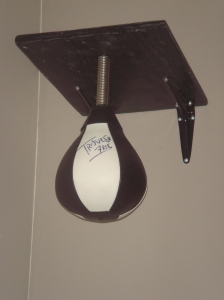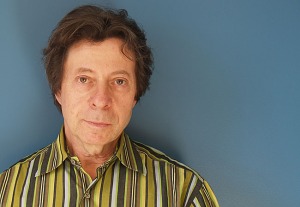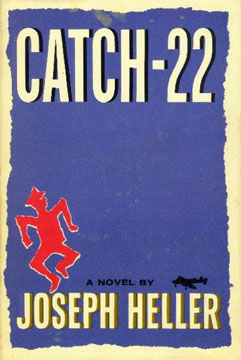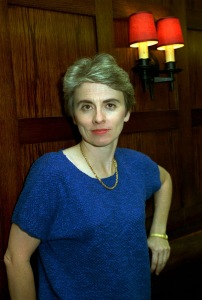ALL-TIME AMERICAN WRITERS TOURNAMENT

***
A bus pulled up at the gate to the training camp. Exiting were thirty-some American writers, most of them not yet selected to the big tourney and wanting to prove their qualifications. Joining them were a handful of the already selected– Ernest Hemingway most prominently; he of the famous grin– out to have a good time but also confident they could prove themselves in any field; against any assortment of literary competition.
 ***
***
Also among the group were our two correspondents, Emily Dickinson and Norman Mailer, the first already in the big event, the other desiring very much to be in it.
Jonathan Franzen, one of the last to step off the bus, blinked at the piercing sunlight.

(Jonathan Franzen.)
***
Awaiting the group were the Combine’s Director and Assistant Director. Count Leo Tolstoy wore a brown cassock, with an enormous Orthodox cross hung around his neck. Dark-browed, bearded, and tall, with Slavic features, he was a formidable-looking man, with formidable-looking eyes.

(Kramskoy portrait of Tolstoy.)
***
His shorter assistant, Vladimir, appeared equally Russian, but was fairer in hair and complexion, and stockier. More akin to a blond bulldog. He wore white shorts and a white t-shirt. Around his neck was a whistle. Facially he resembled a particular Russian president.
They scrutinized the American writers with curiosity and some scorn. Neither of them was easily impressed. Their attitude toward the Combine was, “You’re here to impress us. Show us what you can do.”
The writers, awaiting instructions, broke into small groups. Ernest Hemingway stood with his friend F. Scott Fitzgerald, who he’d convinced to sign up for this.

***
“It’ll be easy to stand out in this crowd, Scott,” Ernest assured his friend while speaking out of the side of his mouth. “The others are mugs.”
Hemingway carried a football under one arm while shadowboxing with imaginary opponents, hoping the Coach (he saw the Count as a coach) would notice. Hemingway paused and slapped Scott on the back, almost knocking him down.
“You will not need that,” Vladimir said to Hemingway.
“What?” the writer asked.
“That!” Vladimir said, pointing to the football, which Hemingway quickly placed on the ground.
Next to Hemingway, Scott looked delicate. Terrified but determined. The perpetual scrub team player eager to make good. His blue eyes considered. He was not without talent. Whether it would impress the formidable count/coach as well as the scouts and analysts was another matter.
“Line up, please,” Vladimir instructed, blowing his whistle twice.
Count Leo stepped from behind his assistant. He perused the lot of them, black eyes considering. Tiny Emily, scrawny Mary Gaitskill and Joyce Carol Oates, and unimpressively short Truman Capote, Scott Fitzgerald and Norman Mailer, among others, were almost beneath his notice. They didn’t look like great writers. “Clerks,” he muttered in Russian. To his mind it’d be a task to coach them up.
 (Joyce Carol Oates.)
(Joyce Carol Oates.)
***
Two in the crowd appeared to have potential– Hemingway, who he’d heard much about, and another tall writer, Franzen, who’d been advertised to the Count as “The American Tolstoy.” Leo observed the transparent arrogance of both men and thought, “Good.”
The Count murmured in Russian. Vladimir translated in a loud voice.
“Count Leo has your submitted manuscripts. He will assess them before deciding your testing regimen. We are here to evaluate your suitability to be presented to the world as great writers.”
Much sarcastic emphasis on the word “great,” as if only Russians could truly be great at the art. It was a voice of authority. Vladimir told the group to stow their gear in their cabins. They were to reassemble at the nearby training ground in precisely one hour. He blew the whistle sharply, twice, to show he meant what he said. The writers scattered.

(Ernest Hemingway.)
*******
(Next: “Combine Day One” continued.)


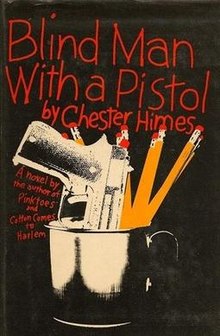

 ***
***


 (Joyce Carol Oates.)
(Joyce Carol Oates.)
